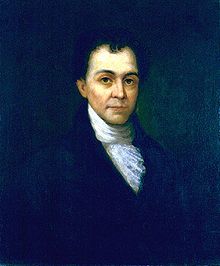Paul Hamilton
Paul Hamilton (born October 16, 1762 in Willtown , Province of South Carolina , † June 30, 1816 in Beaufort , South Carolina ) was an American politician and Governor of South Carolina from 1804 to 1806 . He was also Secretary of the Navy from 1809 to 1812 .
Early years and political advancement
Paul Hamilton had to drop out of school at the age of 16 for financial reasons. During the American Revolutionary War he fought in the ranks of the South Carolina militia. After the war he became a rice farmer. In addition, from 1785 to 1786 he was also a tax collector in his circle and a justice of the peace. Between 1787 and 1789 Paul Hamilton was a member of the House of Representatives from South Carolina . During this time the United States Constitution was ratified. Between 1794 and 1799 he was several times in the Senate of his country and from 1799 to 1804 he was the Comptroller of the State of South Carolina.
Governor of south carolina
In 1804, Hamilton was elected governor of his country by the House of Representatives. His term of office lasted until December 1, 1806 and was uneventful. An attempted reform of the legislature failed because of the parliament's veto; a crisis with the federal government over slave imports was defused with a change in law in South Carolina. Due to a constitutional clause that prohibited direct re-election, Hamilton could not be re-elected in 1806.
Naval Minister
Hamilton was a member of Thomas Jefferson's Democratic Republican Party . His successor in the office of President, James Madison , appointed Hamilton in 1809 as Minister of the Navy in his cabinet. During his tenure, the first naval hospitals were established. Hamilton remained in office during the first few months of the 1812 war . His ideas for building a powerful navy did not meet with the approval of Congress and the President. Therefore, he resigned from his office at the end of 1812. Three US Navy destroyers were later named after him.
Retirement
After his time in Washington, he returned to Beaufort, South Carolina. He died there in 1816. He was married to Mary Wilkinson.
literature
- Robert Sobel and John Raimo (Eds.): Biographical Directory of the Governors of the United States, 1789–1978. Volume 4. Meckler Books, Westport, CT, 1978. 4 volumes.
Web links
- Paul Hamilton in the National Governors Association (English)
- South Carolina Information Highway (English)
- Paul Hamilton in the Miller Center of Public Affairs of the University of Virginia (English)
- Paul Hamilton in the database of Find a Grave (English)
| personal data | |
|---|---|
| SURNAME | Hamilton, Paul |
| BRIEF DESCRIPTION | Governor of south carolina |
| DATE OF BIRTH | October 16, 1762 |
| PLACE OF BIRTH | Willtown , South Carolina |
| DATE OF DEATH | June 30, 1816 |
| Place of death | Beaufort , South Carolina |

